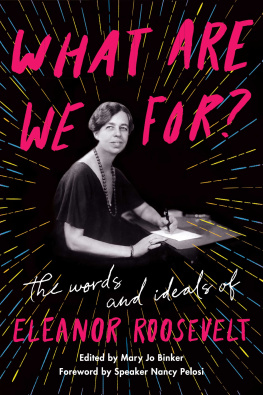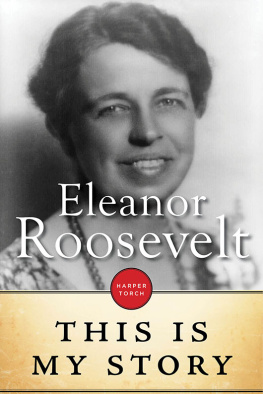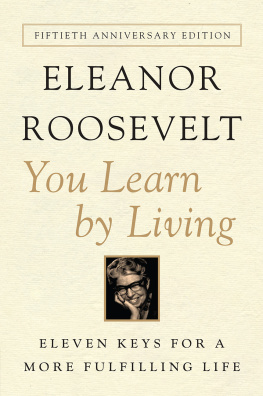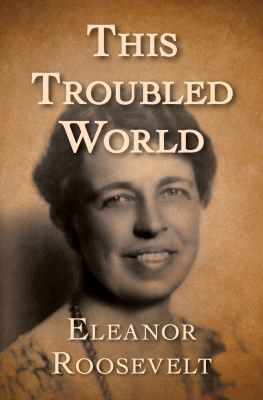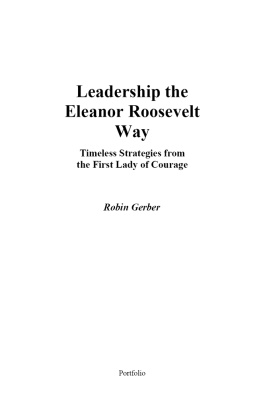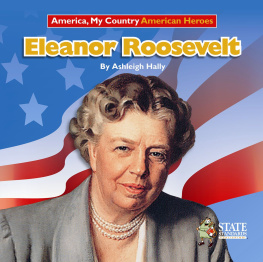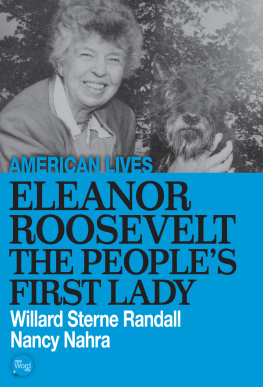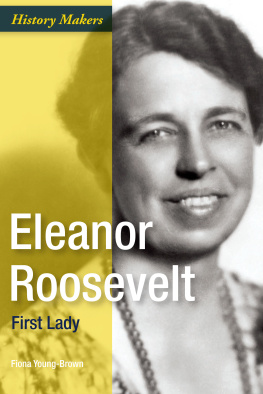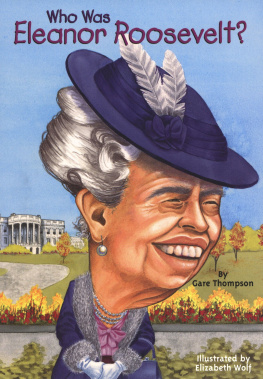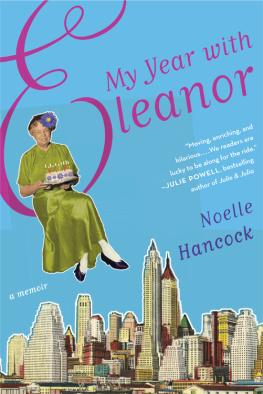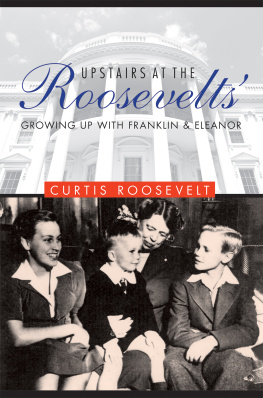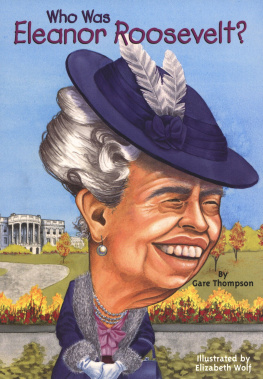Eleanor Roosevelt - What Are We For?: The Words and Ideals of Eleanor Roosevelt
Here you can read online Eleanor Roosevelt - What Are We For?: The Words and Ideals of Eleanor Roosevelt full text of the book (entire story) in english for free. Download pdf and epub, get meaning, cover and reviews about this ebook. year: 2019, publisher: HarperCollins, genre: Politics. Description of the work, (preface) as well as reviews are available. Best literature library LitArk.com created for fans of good reading and offers a wide selection of genres:
Romance novel
Science fiction
Adventure
Detective
Science
History
Home and family
Prose
Art
Politics
Computer
Non-fiction
Religion
Business
Children
Humor
Choose a favorite category and find really read worthwhile books. Enjoy immersion in the world of imagination, feel the emotions of the characters or learn something new for yourself, make an fascinating discovery.
- Book:What Are We For?: The Words and Ideals of Eleanor Roosevelt
- Author:
- Publisher:HarperCollins
- Genre:
- Year:2019
- Rating:4 / 5
- Favourites:Add to favourites
- Your mark:
- 80
- 1
- 2
- 3
- 4
- 5
What Are We For?: The Words and Ideals of Eleanor Roosevelt: summary, description and annotation
We offer to read an annotation, description, summary or preface (depends on what the author of the book "What Are We For?: The Words and Ideals of Eleanor Roosevelt" wrote himself). If you haven't found the necessary information about the book — write in the comments, we will try to find it.
Eleanor Roosevelt: author's other books
Who wrote What Are We For?: The Words and Ideals of Eleanor Roosevelt? Find out the surname, the name of the author of the book and a list of all author's works by series.
What Are We For?: The Words and Ideals of Eleanor Roosevelt — read online for free the complete book (whole text) full work
Below is the text of the book, divided by pages. System saving the place of the last page read, allows you to conveniently read the book "What Are We For?: The Words and Ideals of Eleanor Roosevelt" online for free, without having to search again every time where you left off. Put a bookmark, and you can go to the page where you finished reading at any time.
Font size:
Interval:
Bookmark:
ELEANOR ROOSEVELT DIDNT LOOK BACK, SHE LOOKED FORWARD. She was firmly critical of policy that didnt work for people, but she didnt complain about what she was againstshe repeatedly asserted what she was for. Thats why we still look to her as a leader, a voice of reason and inspiration. It would be so nice to have her here now! Thankfully, we have her words. They guide our emerging leaders as convincingly as they have influenced previous generations around the world.
Eleanor Roosevelt was the longest serving First Lady in the history of the United States. After she left the White House, President Harry Truman called her the First Lady of the World. She brought remarkable gifts to public life, most importantly her conviction that politics begins with beliefs. Doing what is right makes for a better public servantand a better society.
Her own service was based on an ability to reach Americans. Her husband, President Franklin D. Roosevelt, took office in 1933, and early in his first presidential term, she was asked to write a newspaper column. She agreed. Thereafter, six days a week for almost thirty years, until her death in 1962, she wrote My Day.
She usually started with a quick story about someone she had talked to or something on her mind, but often she ended up giving profound advice. For instance: In December 1941, ten days after the Pearl Harbor bombing, she started by recommending a book she had just started about immigrants in America, saying that she hadnt finished it, so I cant really discuss it. But then closed her column with some clear advice: If we cannot meet the challenges of fairness to our citizens of every nationality, of really believing in the Bill of Rights and making it a reality for all loyal American citizens, regardless of race, creed or color, then we shall have removed from the world the one real hope for the future on which all humanity must now rely.
This was politics at its finest. Eleanor Roosevelt believed in true civic action. She insisted that all of us should stand up and be counted, even if standing up and speaking up requires more courage than we think we have. She believed in all peoplewomen and menand she believed that together we would make a better world.
She knew that we could all learn. She took what she learned in Washington to help write a Declaration of Human Rights for the entire world.
In these troubled times, we all could use Eleanor Roosevelts wisdom, every day. I grew up in a family of Roosevelt Democrats. My father was a member of Congress who served most of the time that the Roosevelts were in the White House. So I have always been taught that Eleanor Roosevelt gave voice to the aspirations of all Americans. Read this book and be inspired.
Speaker Nancy Pelosi
ELEANOR ROOSEVELTS LIFE (18841962) IS LIKE A DIAMOND: multifaceted and brilliant. Over the course of seventy-eight years she managed to marry, raise a family, and pursue careers in politics, journalism, education, and diplomacy. Along the way she transformed the role of First Lady, played a vital part in the creation and passage of the Universal Declaration of Human Rights (UDHR), and became an icon of female empowerment.
Much of what Eleanor did and said was based on two profound convictions: first, that every individual mattered, and second, that every individual had a contribution to make. In her case, she dedicated her life to building a countryand a worldwhere diversity and inclusion were part of the fabric of everyday life. She began that effort by using her natural curiosity to learn all she could about how her fellow Americans were faring and by sharing that knowledge as widely as possible. As a debutante, she worked with immigrant children in a settlement house. Later, as a teacher in a New York City private school, she routinely took her students to visit places where they could see the impact of poverty and neglect on those who suffered from it. Once she became First Lady, she traveled the country to learn firsthand about and address peoples needs during the Great Depression, with particular emphasis on the problems of minorities, workers, women, and youth. During World War II she visited military installations at home and abroad to evaluate the living situation and treatment of military personnel and to advocate for better conditions. Equally concerned with civilian home front issues, she traveled to defense factories and plants to monitor the working environment to learn how work-life issues impacted an overwhelmingly female workforce so she could propose practical solutions to any problems. Despite the fear and paranoia surrounding them, she also learned about and championed the cause of those whom the war had marginalized, especially Jewish refugees and Japanese Americans interned by government order after Pearl Harbor.
After she left the White House, her scope broadened to include the needs and desires of people around the world. As the first chair of the United Nations Commission on Human Rights, she persuaded its members to set aside their political and cultural differences as well as their personal rivalries to come together to create the Universal Declaration of Human Rights (UDHR), the cornerstone of the modern human rights movement.
What Are We For? The Words and Ideals of Eleanor Roosevelt distills the most important ideas from her life and voluminous written, oral, and audiovisual recordtwenty-seven books, more than eight thousand newspaper columns, two hundredplus magazine columns, almost six hundred magazine articles, nine radio programs, three television programs, and an extensive, varied multiyear correspondenceinto a convenient guide to some of her most relevant works. Each chapter is organized around a theme, cause, or idea that she championed.
Besides the sheer breadth of her interests, one of the most striking things about Eleanors life and thought is her conviction that many of lifes problems, whether personal or political, had their roots in fear. Fear robbed individuals and societies of their ability to speak out and act. It was the reason nations stockpiled armaments and closed their borders. Above all fear destroyed the possibility of change and growth. People who view with alarm, she wrote pointedly, never build anything.
Eleanor spoke from experience. She started life as a shy, self-conscious child afraid of the dark, of displeasing people, of being unloved. Step-by-step she emancipated herself from her fears and insecurities so that by the time she reached the end of her life, nothing frightened her. Her prescription for dismantling fear (confront it, deconstruct it, and then diligently eradicate it) provides a road map for navigating our own anxious age.
Her unflinching willingness to grapple with pressing questions that still bedevil us also strikes a modern chord. She was not afraid to take a stand on controversial political and social issues such as civil rights, war and peace, birth control, and the role of government in a democracy. Her solutions were invariably grounded in the conviction that individuals in a democracy had to take responsibility for their actions and the actions of their government. Apathy and denial were not options, and staying aloof was a cowardly evasion. To those who railed against the isms of her time, she asked, What are we for?a question that is as timely as todays tweets.
Lastly, Eleanors life is a master class in how to combine vision with action. The woman who emerges from these pages is a practical idealist: a woman who knew how to compromise without abandoning her principles, how to disagree without being disagreeablea skill she honed as a political activist and First Lady and further refined while dueling with the Soviet delegates at the United Nations. She knew, too, how to push for a better future while acknowledging the realities of her time. When she failed, she did not give up. Failure was simply an opportunity to try again. Her persistence was a powerful antidote to the cynicism and apathy of her time and an inspiration to our own.
Font size:
Interval:
Bookmark:
Similar books «What Are We For?: The Words and Ideals of Eleanor Roosevelt»
Look at similar books to What Are We For?: The Words and Ideals of Eleanor Roosevelt. We have selected literature similar in name and meaning in the hope of providing readers with more options to find new, interesting, not yet read works.
Discussion, reviews of the book What Are We For?: The Words and Ideals of Eleanor Roosevelt and just readers' own opinions. Leave your comments, write what you think about the work, its meaning or the main characters. Specify what exactly you liked and what you didn't like, and why you think so.

